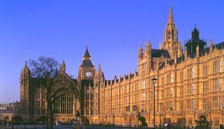The Chancellor of the Exchequer Jeremy Hunt has frozen fuel duty, boosted repairs to pothole damaged roads and targeted solutions to recruitment issues in his Budget statement.
Alongside efforts to reduce energy costs and taxes for small and medium-sized businesses, the Chancellor extended the freeze on fuel tax and extend the existing 5p per litre cut for a period of 12 months in a bid to ease the cost of motoring.
A further £200 million was also committed to fund pothole repairs across the UK as part of a second round of the city region sustainable transport settlements, allocating £8.8bn over next five years.
And away from the roads the Chancellor made changes that would attempt to boost an economy which he said would now avoid slipping into a “technical recession” in 2023.
Addressing MPs in the House of Commons, Hunt said that the Office for Budget Responsibility (OBR) now forecast a 0.2% decline in the economy this year, with the rate of inflation forecast to fall to from 10.7% in Q4 2022 to 2.9% by the end of 2023.
The UK economy is forecast to grow by 1.8% in 2024; 2.5% in 2025; 2.1% in 2026; and 1.9% in 2027.
Revealing his Budget, Hunt said: "Today we build for the future with inflation down, debt falling and growth up. The declinists are wrong, and the optimists are right.
"We stick to the plan because the plan is working."
In his Budget Hunt confirmed that the Energy Price Guarantee will remain at £2,500 for the typical household for the next three months in a move estimated to save the average family £160.
Businesses will still see corporation tax increase from 19% to 25% with all firms which make a profit of more than £250,000 paying 25% tax on their profits from April.
However, small businesses will see their Annual Investment Allowance to £1m, meaning 99% of all businesses can deduct the full value of all their investment from that year’s taxable profits, Hunt said.
Government will also introduce "full expensing" for the next three years, with an intention to make it permanent as soon as we can responsibly do so.
Hunt said that the move meant that every single pound a company invests in IT equipment, plant or machinery can be deducted in full and immediately from taxable profits.
Small or medium-sized businesses will also be able to claim a credit worth £27 for every £100 they spend if they spend 40% or more of their total expenditure on Research and Development.
Elsewhere, Hunt revealed plans to encourage older people to continue working for longer to ease the UK's recruitment challenges.
An apprenticeship-style "Returnship" will aim to re-train over-50s to return them to the workplace.
Government will also increase the pensions annual tax-free allowance from £40,000 to £60,000 and will abolish the Lifetime Allowance - previously set at £1.07m - in a bid to discourage early retirement.
"Three-and-a-half million people of pre-retirement age, over 50, are not part of the workforce - up 320,000 since before the pandemic," the Chancellor said.
"Older people are the most skilled and experienced peopple we have. No country can thrive if it turns its back on such a wealth of talent and ability."
As part of its bid to reduce the UK’s carbon emissions and boost the sustainability of its energy sector, the Chancellor committed £20bn of support for the early development of carbon, capture, usage and storage.
Government will also extend its Climate Change Agreement scheme for two years to allow eligible businesses £60m of tax relief on energy efficiency measures.
Nuclear power, meanwhile, will be reclassed as 'environmentally sustainable' to give the sector access to the same investment incentives as renewable energy.















Login to comment
Comments
No comments have been made yet.